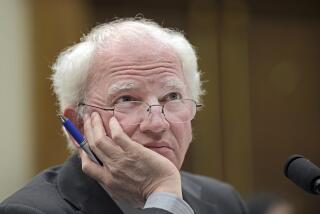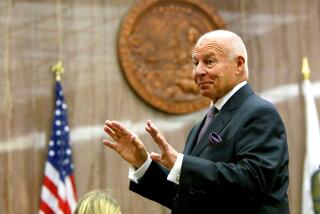High Court Disbars Santa Ana Attorney : Leonard Dale Basinger Had Admitted Stealing From Client Trust Funds and Partner Accounts
- Share via
A 43-year-old Santa Ana lawyer who pleaded guilty in 1985 to stealing more than $250,000 from his clients’ trust funds and his partners’ accounts was disbarred Monday by the state Supreme Court.
Attorneys for Leonard Dale Basinger asked for leniency, arguing to the high court that he had paid “every last dollar” of restitution. But the justices responded that he was disbarred because of the enormity of the crime and its effect on the legal profession’s high standards.
“I hope the message is loud and clear: Thou shalt not steal from your clients or your fellow lawyers,” said Superior Court Judge Theodore E. Millard, when he heard the news of Basinger’s disbarment.
Millard had sentenced Basinger to two years in state prison in 1983, with the admonishment: “If I were the state Supreme Court, I would disbar you. . . . You got too greedy. You had to have it all--now.”
Complaint by Partner
Basinger, who had built up a highly successful practice after 14 years as a lawyer, was arrested in 1981 after one of his law partners made a complaint to the district attorney’s office over missing money.
Basinger was found guilty of one count of grand theft in 1982, but in 1985, the 4th District Court of Appeal reversed the conviction because of improper jury instructions.
Basinger then pleaded guilty in a plea-bargain arrangement in which he would be placed on probation. He ended up serving a total of eight months in Orange County Jail.
Basinger’s wife, Valynda Kiser, served less than two months in County Jail after she pleaded guilty in 1983 to removing at least $100,000 from the firm’s accounts herself.
Kiser was single and a secretary in Basinger’s office in the late 1970s. According to the narrative presented in the state Supreme Court’s decision, Kiser persuaded Basinger to let her invest his money in the commodities market after he lost money in the stock market. But she ended up borrowing from one of his clients and one of his partners to try to cover losses. She later revealed to him she had taken from numerous accounts of clients and law partners, according to the Supreme Court documents.
Basinger and Kiser married, but at Basinger’s trial, his attorney, Paul Meyer, tried to convince the jury that it was Kiser, not Basinger, who took the money.
“It was a case of a lawyer getting too busy to run his own office,” Meyer said Monday after learning of Basinger’s disbarment.
But prosecutors showed that Basinger also had heavy gambling losses at the time, and argued that it was a reasonable inference that he knew what Kiser was doing.
The couple are still married and have two young children. Basinger is now working as a clerk for several other lawyers, according to his attorney, Allan H. Stokke.
Stokke said he was not surprised by the court’s decision but indicated that the news upset him.
After a hearing in which Stokke offered numerous character witnesses, a reviewing officer in the disbarment proceedings had recommended to the state Supreme Court’s review department that Basinger be reinstated to the bar.
But the review panel unanimously recommended his disbarment, and the high court agreed.
“It is obvious that the seriousness of the offense weighs heavily in favor of disbarment,” the court stated. “We may infer from the evidence that (Basinger’s and Kiser’s) scheme would have continued indefinitely, since it only ceased” when discovered by a law partner.
Reinstatement Possibility
But Stokke cited the reviewing officer’s report, which stated that Basinger had been suspended for almost five years and that was punishment enough.
“Except for this one mistake, he was a very good lawyer,” Stokke said. “We will apply for reinstatement as soon as possible; we hope that is immediately.”
Application for reinstatement must be made to the State Bar, which had suspended Basinger in 1985, and then disbarred him. Basinger had petitioned the state Supreme Court, which has the final word when an attorney challenges the State Bar’s decision.
Times staff writer Phil Hager contributed to this story from San Francisco.
More to Read
Sign up for Essential California
The most important California stories and recommendations in your inbox every morning.
You may occasionally receive promotional content from the Los Angeles Times.













